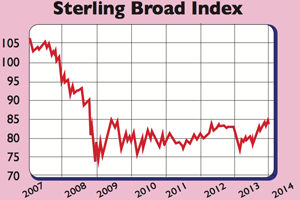Get the latest financial news, insights and expert analysis from our award-winning MoneyWeek team, to help you understand what really matters when it comes to your finances.
You are now subscribed
Your newsletter sign-up was successful
Want to add more newsletters?

Twice daily
MoneyWeek
Get the latest financial news, insights and expert analysis from our award-winning MoneyWeek team, to help you understand what really matters when it comes to your finances.

Four times a week
Look After My Bills
Sign up to our free money-saving newsletter, filled with the latest news and expert advice to help you find the best tips and deals for managing your bills. Start saving today!
The pound's rebound on foreign-exchange markets has been one of the most closely watched trends over the past few months. Sterling has jumped to a five-year high against a basket of major trading partners' currencies on a trade-weighted basis (see chart).
It is at a two-and-a-half-year high of $1.64 against the US dollar, having gained more than 10% since last summer. Against the euro it has reached a 12-month high of €1.21.
The pound could now hurt growth by making exports expensive. The Bank of England worries that "any further substantial appreciation" could hamper the recovery. Clothing retailers Burberry and Asos warned that the strong pound was starting to affect their foreign sales.
MoneyWeek
Subscribe to MoneyWeek today and get your first six magazine issues absolutely FREE

Sign up to Money Morning
Don't miss the latest investment and personal finances news, market analysis, plus money-saving tips with our free twice-daily newsletter
Don't miss the latest investment and personal finances news, market analysis, plus money-saving tips with our free twice-daily newsletter
The main driver of the currency's strength has been the turnaround in the economy. Recent data have been unexpectedly strong, and Britain's impressive growth has made markets look forward to eventual interest-rate hikes.
Only America, which is recovering even faster, is likely to raise rates before Britain, says Capital Economics. In Europe, monetary policy is likely to become even looser, if it changes at all.

Surging house prices may also be fuelling anticipation of rate rises, to prevent a bubble. The Bank's governor, Mark Carney, "has been caught out by the strength of the labour market [and] appears to be making the same mistake with the housing market", says Larry Elliott in The Guardian.
But Carney could well keep a lid on sterling by lowering the unemployment target or making it clearer that rates won't rise for a long time, even if it hits 7%. The decline in inflation gives him more scope to keep rates lower longer than the markets anticipate, says Morgan Stanley.
Given this, and the fact that the US might raise rates before Britain, sterling will most likely weaken slightly against the dollar. With Europe still weak, it could make further, albeit unspectacular, gains against the euro.
Get the latest financial news, insights and expert analysis from our award-winning MoneyWeek team, to help you understand what really matters when it comes to your finances.
MoneyWeek is written by a team of experienced and award-winning journalists, plus expert columnists. As well as daily digital news and features, MoneyWeek also publishes a weekly magazine, covering investing and personal finance. From share tips, pensions, gold to practical investment tips - we provide a round-up to help you make money and keep it.
-
 Should you buy an active ETF?
Should you buy an active ETF?ETFs are often mischaracterised as passive products, but they can be a convenient way to add active management to your portfolio
-
 Power up your pension before 5 April – easy ways to save before the tax year end
Power up your pension before 5 April – easy ways to save before the tax year endWith the end of the tax year looming, pension savers currently have a window to review and maximise what’s going into their retirement funds – we look at how

